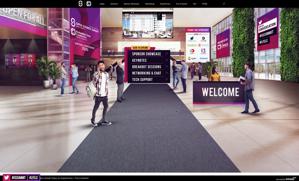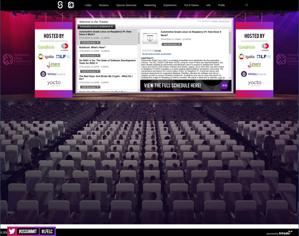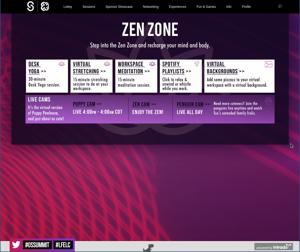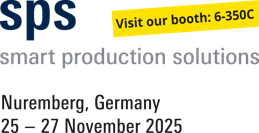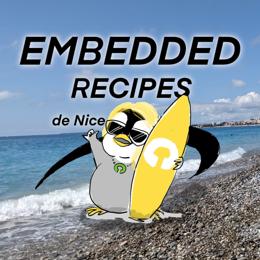ELC-NA 2020 - A Virtual Experience
In 2020, things tend to be a bit different from what we had before. This is also true for this year's Embedded Linux Conference in North America. The need for keeping physical distance required the Linux Foundation to switch form a real conference to a fully virtual one.
The main advantage, both for Pengutronix and many others too, was that it was the first chance to easily participate in the North America version of the ELC. What would have required lots of time and money for booking flight, hotels, the conference, and actually traveling to the US boiled down to pay 50$ for the online access and have some extra coffees to manage the time shift.
The Experience
Just to let you know up front: This worked much better we would have thought at first, and it was already announced that some parts of this format will potentially survive the 'virtual-only era'.
The virtual experience was driven by a neat integration between a set of online services:
With onlinexperiences.com, a general landing page for the event was created that also attempted to give the visual impression of being in an actual event location. This site was also where the sponsor booth could be visited to see video recording, marketing material or chat with them.
The main conversation moved from normal floor meetings to a Slack instance. They provided a dedicated channel for each track, a general one, a helpdesk, and some others. This indeed was one of the best innovations brought to the experience as at least the Embedded and the Yocto channel were quite popular (~800 and ~300 participants) and allowed to talk about the missing buffet as well as about technical details and upcoming ideas.
The big constant in terms of websites was sched.com that (as also the years before) provided a good overview over the entire schedule of key-notes, talks, events, mini-summits, etc. With the main difference that each entry now had a Watch now link that directly took you to the talks live video.
Talks themself then again took place on onlineexperiences.com. Some were live, some pre-recorded. The latter gave the speaker the great opportunity to answer incoming questions live in the Q&A interface while the talk was still running. A great technical team in the background ensured that hardly any issues appeared during presentation.
For the BoFs they used another service called Airmeet. This provides a slightly more interactive platform allowing for example to let participants answer questions in video, chat with each other and post or vote for questions. Unfortunately, this platform turned out to have some limitations and conceptual issues that prevented a fully flexible interaction between attendees.
And, despite official lunch and coffee breaks were quite short, at least compared to a real conference, there was one major advantage that shouldn't be left unmentioned: There was coffee available! All the time, even during talks. Really! Amazing...
The Talks
Here we would like to share some of the talks we've been attending and found either quite interesting, entertaining or instructive.
Invest in Mainline Linux: Choose Your Own Adventure - Dexter Travis, Precision Planting
This talk will tell you why a super tux Kernel turned out to actually be an old man tux Kernel and how that made a company use the actual tux Kernel. Divided into several 'levels', this journey is a great war story from a small company that began to learn and love the benefits of mainline Linux, including many of the same arguments and tradeoffs that convince our customers as well.
Yocto Project LTS Releases - Nicolas Dechesne, Linaro & David Reyna, Wind River
An overview about the motivation behind the Yocto LTS release project, what it intends to provide and what not, and how it will be maintained. This is worth having a look at for everyone having to decide what Yocto releases to pick and when to migrate.
Kernel Coding the Upstream Way - Tim Bird, Sony
A great and quite entertaining talk about some good and bad practices for writing code in the Linux kernel, but (partly) also applicable to other projects using C. From proper NULL pointer checks and 'goto' usage over efficiency and code optimization considerations to the usage and demystification of several kernel macros this talk uses many real world examples and isn't just targeted at kernel gurus.
Introduction to Embedded Linux Security - Sergio Prado, Embedded Labworks
This talk from Sergio gives a comprehensive overview about the different aspects of securing Embedded Linux system, mainly recommended to those who are new to these topics. Starting with some general considerations and the advice to do proper threat modeling to know what one actually needs protect against, Sergio describes the basics of ensuring integrity of the base system with a secure boot and lists options to encrypt the data in different use-cases. The talk also quickly touches secure coding practices, program access limitations and system updates. Note that the slides actually contain even more infos than the time allowed to share.
Reproducible Builds and Hash Equivalence in the Yocto Project - Joshua Watt, Garmin
Joshua presents two of the most notable developments of the Yocto Project in the recent releases: The first one is hash equivalence detection which allows better usage of the Yocto shared state cache. He points out how recipe changes not affecting the actual recipe output are detected and how this prevents unnecessary rebuilds of dependent packages. In the second part of his talk he gives a close look at what the Yocto project does to ensure binary reproducibility of package builds, together with some insights on how the related QA tests work, how they could be improved further and what else one can expect to come up.
PipeWire: The New Multimedia Service, Now Ready for Automotive - Julian Bouzas, Collabora
Julian described how PipeWire is getting closer to replace PulseAudio and JACK. From the embedded perspective, especially the lower CPU usage and more flexible control via the session manager API is interesting. In addition to audio, PipeWire also supports video, making it much easier to build complex use-cases, where video needs to be passed between multiple processes.
The goal is to replace PulseAudio in Fedora soon, which will hopefully lead to fixes for any corner-case issues that have not been exposed so far.
10 Years of Linux Security - A Report Card - Bradley Spengler, Open Source Security, Inc.
Bradley, as the author of the grsecurity patch set, gave an overview of the enhancements to Linux security over the last 10 year. The most interesting part was an analysis of the shortcomings of the current processes centered around addition new features (such as user namespaces), vulnerability tracking and backporting to stable kernels. It seems that more effort needs to be focused on the thankless but important work of stable kernel maintenance.
His talk triggered a follow-up discussion on the state of the LinuxFoundation's Core Infrastructure Project on Slack. Although the website is somewhat outdated, they have published a new report on the Census Program and started a survey for contributors to FOSS. The goal is to understand which projects are critical to the whole community and are most at risk via a thorough analysis.
Closing Game and Remarks
An ELC is not an ELC without the famous closing game hosted by Tim Bird every year since ages. But how would the "red green game" and rock-paper-scissors translate into the virtual world?

Time announces that the closing game will likely fail

Closing game goto question

Closing game line length limit question

Closing game rock-paper-scissors
Luckily, Tim Bird is also a great entertainer from his home office, promising that all games are totally unfair and that the web server for the games he wrote in the afternoon is sure to fail. That turned out not to be the case (apart from some minor glitches) and at the end there was, as always, a group of lucky winners, including us, yeah!
The ELC ended with some final notes about the future that we would also like to share:
This year's ELC Europe 2020, supposed to take place in Dublin, will also be virtual and a new attempt for an in-person meeting in Dublin will be made in October 2021.
Stay healthy! And see you!
Weiterführende Links
Pengutronix auf der SPS in Nürnberg
Nach einigen Jahren Abwesenheit sind wir in diesem Jahr zurück auf der SPS 2025 in Nürnberg! Sie finden uns in Halle 6, Stand 6-350C. Wir freuen uns darauf neue und bekannte Freunde, Partner und Kunden zu treffen. Wie immer zeigen wir Demonstratoren zu aktuellen Themen an unserem Messestand.
GStreamer Conference 2025
This years GStreamer conference was held at the end of Oktober in London, UK. Since GStreamer is our goto-framework for multimedia applications, Michael Olbrich and me were attending this years conference to find out what's new in GStreamer and get in touch with the community.
Talks, Workshops und Zeit am Strand - Die Embedded Recipes 2025
Ich war dieses Jahr Teil einer kleinen Delegation Pengutronixianer, die an der Embedded-Recipes-Konferenz in Nizza, Frankreich teilgenommen haben. Wir hatten eine tolle Zeit in Nizza und wollen jetzt die Gelegenheit nutzen nochmal einen Blick zurück auf unsere Lieblingstalks und unseren labgrid-Workshop zu werfen.


